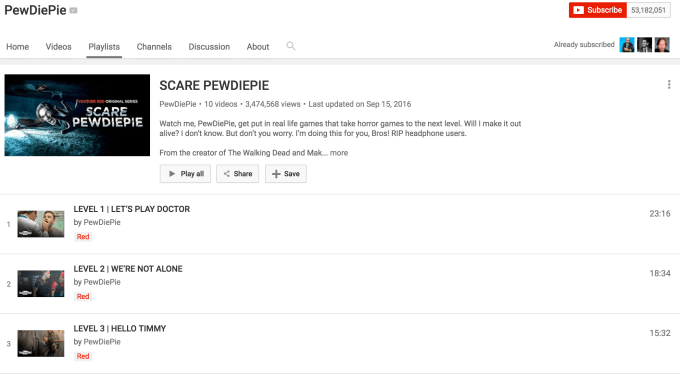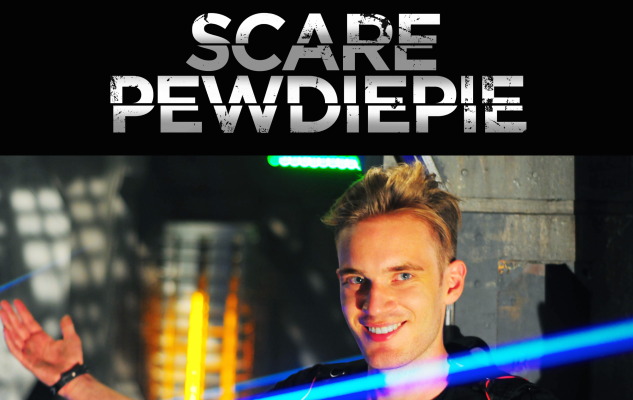YouTube says it’s cancelling the second season of vlogger star PewDiePie’s reality show, and has booted his channel from its premium advertising program. The announcement comes shortly after news that Disney’s Maker Studios was severing ties with PewDiePie, whose real name is Felix Kjellberg, after he posted a series of videos featuring anti-Semitic clips and messages.
PewDiePie is the most-subscribed YouTube channel with over 53 million followers on the network.
According to a Wall Street Journal report, Kjellberg had posted nine videos containing anti-Semitic clips or Nazi-related images. Three of the videos published in January have been removed from the channel. In one skit, Kjellberg paid a group of Sri Lankan men to hold up a sign that read “Death to All Jews,” and another had a figure dressed as Jesus defending Hitler.
PewDiePie previously had his own network with Maker Studios. But the company, bought by Disney in 2014, ended its association with the vlogger as a result of these videos and the Wall St. Journal’s reporting.
It’s no surprise that the fallout now continues with YouTube, which is also ending its relationship with PewDiePie, though it hasn’t banned the channel from its network entirely.
PewDiePie had been one of higher profile content wins for YouTube’s premium service, YouTube Red. The subscription-based offering removes ads from YouTube and offers other features, like background play and offline access, all for $10 per month. But YouTube Red has also been ramping up its original content offerings with a slate of series designed to attract a younger audience who are more familiar with YouTube stars than those in Hollywood.
One of these shows was a reality series called “Scare PewDiePie,” where Kjellberg was dragged through terrifying real-life experiences. The show had been renewed for a second season last June, but a premiere date had not yet been set, Variety reports.
According to a YouTube spokesperson, the show will not be returning.
“We’ve decided to cancel the release of “Scare PewDiePie” Season 2 and we’re removing the PewDiePie channel from Google Preferred,” the spokesperson told TechCrunch.
Google Preferred is the network’s advertising program that aggregates YouTube’s top talent into easy-to-buy packages aimed at brand advertisers, who can choose from a dozen lineups of channels across categories like Beauty & Fashion, Entertainment & Pop Culture, and Foods & Recipes, for example.
PewDiePie won’t be prevented from running ads against his videos going forward, but these will no longer fetch top dollar due to the channel’s removal from Google Preferred.

However, YouTube has not gone so far as to remove “Scare PewDiePie” from its YouTube Red service – the videos are still available to subscribers as of today. Meanwhile, several of the offensive videos have been taken down, but it’s unclear if PewDiePie removed them himself or if YouTube did.
YouTube’s policies on content removal leave wiggle room for the company to determine how it wants to proceed on a case-by-case basis. It doesn’t remove content that’s generally offensive, but does have policies against what it calls “hateful content.”
“…we don’t support content that promotes or condones violence against individuals or groups based on race or ethnic origin, religion, disability, gender, age, nationality, veteran status, or sexual orientation/gender identity, or whose primary purpose is inciting hatred on the basis of these core characteristics.”
According to Engadget, PewDiePie defended his actions in a video that’s now been deleted, saying: “what I just think — and I believe strongly in — is that it is 2017 now. We’re going to have to start separating what is a joke, and what is actually problematic. Is a joke actually pure racism? Is something that would be considered a joke purely homophobic, or anti-semitic and all these things? Context fucking matters.”
The vlogger also explained on his blog that the content he creates is entertainment, and not serious political commentary.
“Though this was not my intention, I understand that these jokes were ultimately offensive,” he said. “As laughable as it is to believe that I might actually endorse these people, to anyone unsure on my standpoint regarding hate-based groups: No, I don’t support these people in any way.”
